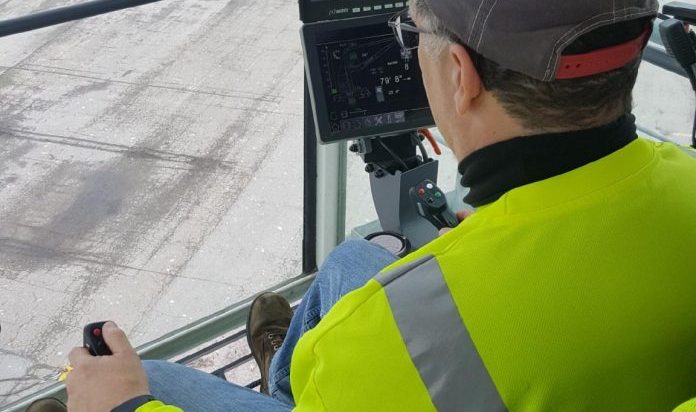Not Your Average Coder: How a 53-Year-Old Longshoreman Became a Full-Stack Web Developer

Mark Piscioneri doesn’t seem like a typical full-stack developer. From age 46 to 53, he was a union longshoreman and crane operator at the Port of Cleveland. And before enrolling in the intensive 24-week Case Western Reserve University Coding Boot Camp, his experience working with code was about as minimal as you might expect.
“The last time I tried to ‘program’ anything on a computer was back in high school, on what must have been one of the first Macs,” Mark said, laughing.
But he’s part of a new wave of working professionals who are making the leap from trade and manufacturing skills into cybersecurity, UX/UI design, and web development—even mid-career. Far from being risky, it’s actually a well-thought-out, strategic move for a more sustainable future.
Planning for tomorrow, today
When asked why he first considered a new career in full-stack web development, Mark’s answer was simple: growing uncertainty in his industry.
“My wife and I are getting close to retirement age, and I wanted to alleviate some of the financial stress and give us more options through freelancing or generating my own business with coding,” he continued. “If I need to make a move to shore up our finances or save for retirement, now’s the time.”
Mark saw the boot camp as a life-changing opportunity. “It’s an investment in my future. If I don’t change anything, nothing is going to change. I can’t see myself working into my 60’s out in the cold,” he said.
And that decision led Mark on a fast-paced journey of technical skill building, group collaboration, and a better understanding of his strengths—and what he still has left to learn.
Failing forward
“When I first got into the course my learning curve was straight up. I didn’t know anything,” Mark admitted. “I found myself doing constant Google searches and going down rabbit holes, and I kept thinking, ‘What did I get myself into? This is insane.’” But Mark has a simple piece of advice for anyone who’s nervous about learning to code.
“Everyone has been in your shoes before,” Mark said. “But it’s important to remember that your classmates and the teaching assistants want you to succeed.”
CWRU Boot Camps is geared to push students through a lot of information at an accelerated pace. They’re designed to be a little overwhelming at times because, in order to succeed, students need to rethink the way they work.
“One of my TAs taught me to set a time limit: to focus for every 15-30 minutes on a single task, then move on. That alone was a huge skill shift that helped me parcel out the workload, “ Mark said. “As a longshoreman I was used to just putting the time in and being productive, but in this case, if you’re not actually coding you’re not moving forward.”
“The cool part about it is that you’ve got the ability to fail and still fall forward. That failure was the hardest part for me to understand,” he said. Once he learned that stumbling is just another part of learning, Mark’s “failures” quickly turned into a fresh set of skills—and an impressive portfolio.
Learning by doing
“My first coding project involved compiling a database of over 600 celebrity faces, then tying that database to a horoscope API with each celebrities birth date and sign,” said Mark. The end result was an interactive website that compares uploaded photos to this celebrity database for a personalized matching horoscope.
“I was using facial recognition software that reads 84 distinct points on a person’s face to determine their mood,” he said. “Two months ago, I didn’t know anything [about coding]. Now I’m working with APIs and facial recognition software.”
Mark’s amazement at how quickly his skills improved is a common reaction from boot camp participants. “You don’t realize the pace that you’re learning until you try to explain the course to friends and family,” he said.
“The program talks a lot about becoming ‘employee ready vs. employee competitive,’ and that’s what the course is really all about,” Mark said. “You start off feeling like there’s no comfort zone at all, and by the end of the course, you’re confident in the skills you’ve developed. You truly feel ‘employee competitive.’”
But most of all, he learned to be proud and self-assured. “The friendships and camaraderie will go on for years,” Mark said. “But confidence is what I really got out of this class.”
There’s never a good time to change your life
It’s never easy to change gears. Mark recognizes that enrolling in a 24-week intensive coding boot camp as a full-time employee was a big commitment (. But that commitment—to his and his wife’s retirement—is exactly why he signed up for the coding boot camp in the first place.
There will always be obstacles to learning new skills, especially technical ones. But according to Mark, with the right motivation and a little time management, anything is possible.
“Find out what works best for you in terms of your time management and really stick to it,” Mark said. “Ignore distractions. Understand why you’re doing what doing. That helped me get through more challenges than anything. Thinking about my wife getting to retire on time made all the work worth it.”
When asked about what Mark sees for himself in the future, he’s confident—even enthusiastic.
“I actually already have a couple irons in the fire on the logistics side of things at my current job,” Mark hinted, already leveraging his new skills before he’s even graduated. “Now I’m the one who can write the code to optimize some of the logistics at the port terminals for our clients.”

 Live Chat
Live Chat